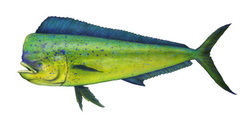Fatal histamine poisoning
 Earlier in 2014 two people met a tragic death after eating fish. The culprit was found to be scombroid poisoning.
Earlier in 2014 two people met a tragic death after eating fish. The culprit was found to be scombroid poisoning.
Scombroid poisoning is a now-outdated term for histamine fish poisoning. It is also sometimes known as pseudoallergic fish poisoning, histamine overdose, or mahi-mahi flush.
Histamine is colorless, odorless and tasteless. Scombroid fish histamine poisoning is hard to detect without scientific equipment, and can be fatal.
‘The term scombroid was used because the first fish species implicated in this poisoning were from the suborder Scombridae, which includes mackerel, tuna, marlin, swordfish, albacore, bonito, skipjack, and almost 100 other species (Scombridae is derived from the Greek word scombros, which means mackerel or tunny). The term histamine fish poisoning is now considered more appropriate because many cases are from nonscombroid fish. Examples include mahi-mahi (dolphin fish), amberjack, herring, sardine, anchovy, and bluefish.’
Source: Medscape
Histamine poisoning is not uncommon
Doctor warns scombroid poisoning involved in Bali death of Noelene and Yvana Bischoff is not rare
Connor O’Brien
Albert & Logan News
February 10, 2014
Yvana Bischoff, 14, and Noelene Bischoff who died in Bali after suspected food poisoning. Source: News Limited
A BRISBANE doctor who treated his wife for the same type of food poisoning which killed a Queensland mother and daughter in Bali says the illness is more common than most people think.
Noelene and her 14-year-old daughter Yvana Bischoff died while holidaying in Bali in January.
The subsequent autopsy indicated that they died from a combination of scombroid poisoning from food that was suspected to be tainted and existing medical conditions.
Experienced Daisy Hill general practitioner Nick Stephens cautioned that scombroid poisoning is actually not that rare, after treating his wife for it last year.
“It’s the most common form of fish poisoning in the world,” Dr Stephens said.
“But on the other hand, the complication of death (resulting from scombroid poisoning) is rare.”
Having been in the industry for 35 years, Dr Stephens was stunned when his wife Lorraine turned up at his clinic on Melbourne Cup day last year with systems of scombroid poisoning.
Mrs Stephens had been out for lunch at a South Bank restaurant when she and three friends had a major reaction about ten minutes after eating mahi mahi fish – the same variety the Bischoff’s had consumed shortly before their deaths.
Dr Stephens, 64, said when his wife arrived at his work she was bright red, having palpitations and struggling to breathe.
“I’ve never seen a patient ever look so red with a headache and the palpitations. So, obviously, with a severe dosage it can kill,” he said.
Dr Stephens said an analysis of the symptoms left him in no doubt that his wife had suffered from scombroid poisoning, even though it can be difficult to confirm.
“You cannot run a blood test or doing anything else to confirm it,” he said.
“They’ve had exactly the same problem with these people overseas, they can’t confirm it but they can’t find anything else.”
Since the attack, she has suffered from pancreatitis, which her husband believes may be a rare complication from scombroid poisoning.
Source: the Courier Mail

